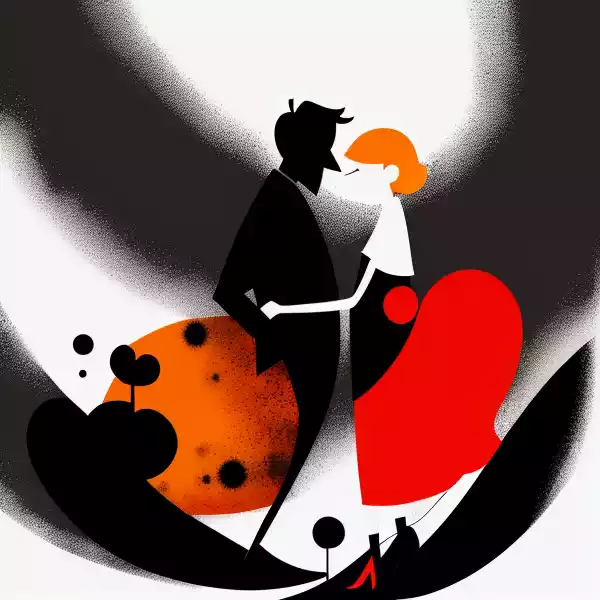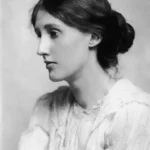 | |
Mr. Bennett and Mrs. Brown | |
| Author | Virginia Woolf |
|---|---|
| Published |
1924
|
| Language | English |
| Nationality | British |
| Genre | Modernist Literature, Stream of Consciousness |
1924 Short Story
Mr. Bennett and Mrs. Brown
Mr. Bennett and Mrs. Brown is an English Modernist Literature, Stream of Consciousness short story by British writer Virginia Woolf. It was first published in 1924.
Mr. Bennett and Mrs. Brown
by Virginia Woolf
It seems to me possible, perhaps desirable, that I may be the only person in this room who has committed the folly of writing, trying to write, or failing to write, a novel. And when I asked myself, as your invitation to speak to you about modern fiction made me ask myself, what demon whispered in my ear and urged me to my doom, a little figure rose before methe figure of a man, or of a woman, who said, “My name is Brown. Catch me if you can.”
Most novelists have the same experience. Some Brown, Smith, or Jones comes before them and says in the most seductive and charming way in the world, “Come and catch me if you can.” And so, led on by this will-o’-the-wisp, they flounder through volume after volume, spending the best years of their lives in the pursuit, and receiving for the most part very little cash in exchange. Few catch the phantom; most have to be content with a scrap of her dress or a wisp of her hair.
My belief that men and women write novels because they are lured on to create some character which has thus imposed itself upon them has the sanction of Mr. Arnold Bennett. In an article from which I will quote he says: “The foundation of good fiction is character-creating and nothing else. . . . Style counts; plot counts; originality of outlook counts. But none of these counts anything like so much as the convincingness of the characters. If the characters are real the novel will have a chance; if they are not, oblivion will be its portion. . . .” And he goes on to draw the conclusion that we have no young novelists of first-rate importance at the present moment, because they are unable to create characters that are real, true, and convincing.
These are the questions that I want with greater boldness than discretion to discuss to-night. I want to make out what we mean when we talk about “character” in fiction; to say something about the question of reality which Mr. Bennett raises; and to suggest some reasons why the younger novelists fail to create characters, if, as Mr. Bennett asserts, it is true that fail they do. This will lead me, I am well aware, to make some very sweeping and some very vague assertions. For the question is an extremely difficult one. Think how little we know about characterthink how little we know about art. But, to make a clearance before I begin, I will suggest that we range Edwardians and Georgians into two camps; Mr. Wells, Mr. Bennett, and Mr. Galsworthy I will call the Edwardians; Mr. Forster, Mr. Lawrence, Mr. Strachey, Mr. Joyce, and Mr. Eliot I will call the Georgians. And if I speak in the first person, with intolerable egotism, I will ask you to excuse me. I do not want to attribute to the world at large the opinions of one solitary, ill-informed, and misguided individual.
My first assertion is one that I think you will grantthat every one in this room is a judge of character. Indeed it would be impossible to live for a year without disaster unless one practised character-reading and had some skill in the art. Our marriages, our friendships depend on it; our business largely depends on it; every day questions arise which can only be solved by its help. And now I will hazard a second assertion, which is more disputable perhaps, to the effect that on or about December 1910 human character changed.
I am not saying that one went out, as one might into a garden, and there saw that a rose had flowered, or that a hen had laid an egg. The change was not sudden and definite like that. But a change there was, nevertheless; and, since one must be arbitrary, let us date it about the year 1910. The first signs of it are recorded in the books of Samuel Butler, in The Way of All Flesh in particular; the plays of Bernard Shaw continue to record it. In life one can see the change, if I may use a homely illustration, in the character of one’s cook. The Victorian cook lived like a leviathan in the lower depths, formidable, silent, obscure, inscrutable; the Georgian cook is a creature of sunshine and fresh air; in and out of the drawing-room, now to borrow The Daily Herald, now to ask advice about a hat. Do you ask for more solemn instances of the power of the human race to change? Read the gamemnon, and see whether, in process of time, your sympathies are not almost entirely with Clytemnestra. Or consider the married life of the Carlyles, and bewail the waste, the futility, for him and for her, of the horrible domestic tradition which made it seemly for a woman of genius to spend her time chasing beetles, scouring saucepans, instead of writing books. All human relations have shiftedthose between masters and servants, husbands and wives, parents and children. And when human relations change there is at the same time a change in religion, conduct, politics, and literature. Let us agree to place one of these changes about the year 1910.
I have said that people have to acquire a good deal of skill in character-reading if they are to live a single year of life without disaster. But it is the art of the young. In middle age and in old age the art is practised mostly for its uses, and friendships and other adventures and experiments in the art of reading character are seldom made. But novelists differ from the rest of the world because they do not cease to be interested in character when they have learnt enough about it for practical purposes. They go a step further; they feel that there is something permanently interesting in character in itself. When all the practical business of life has been discharged, there is something about people which continues to seem to them of overwhelming importance, in spite of the fact that it has no bearing whatever upon their happiness, comfort, or income. The study of character becomes to them an absorbing pursuit; to impart character an obsession. And this I find it very difficult to explain: what novelists mean when they talk about character, what the impulse is that urges them so powerfully every now and then to embody their view in writing.
So, if you will allow me, instead of analysing and abstracting, I will tell you a simple story which, however pointless, has the merit of being true, of a journey from Richmond to Waterloo, in the hope that I may show you what I mean by character in itself; that you may realise the different aspects it can wear; and the hideous perils that beset you directly you try to describe it in words.
One night some weeks ago, then, I was late for the train and jumped into the first carriage I came to. As I sat down I had the strange and uncomfortable feeling that I was interrupting a conversation between two people who were already sitting there. Not that they were young or happy. Far from it. They were both elderly, the woman over sixty, the man well over forty. They were sitting opposite each other, and the man, who had been leaning over and talking emphatically to judge by his attitude and the flush on his face, sat back and became silent. I had disturbed him, and he was annoyed. The elderly lady, however, whom I will call Mrs. Brown, seemed rather relieved. She was one of those clean, threadbare old ladies whose extreme tidinesseverything buttoned, fastened, tied together, mended and brushed upsuggests more extreme poverty than rags and dirt. There was something pinched about hera look of suffering, of apprehension, and, in addition, she was extremely small. Her feet, in their clean little boots, scarcely touched the floor. I felt that she had nobody to support her; that she had to make up her mind for herself; that, having been deserted, or left a widow, years ago, she had led an anxious, harried life, bringing up an only son, perhaps, who, as likely as not, was by this time beginning to go to the bad. All this shot through my mind as I sat down, being uncomfortable, like most people, at travelling with fellow passengers unless I have somehow or other accounted for them. Then I looked at the man. He was no relation of Mrs. Brown’s I felt sure; he was of a bigger, burlier, less refined type. He was a man of business I imagined, very likely a respectable corn-chandler from the North, dressed in good blue serge with a pocket-knife and a silk handkerchief, and a stout leather bag. Obviously, however, he had an unpleasant business to settle with Mrs. Brown; a secret, perhaps sinister business, which they did not intend to discuss in my presence.
“Yes, the Crofts have had very bad luck with their servants,” Mr. Smith (as I will call him) said in a considering way, going back to some earlier topic, with a view to keeping up appearances.
“Ah, poor people,” said Mrs. Brown, a trifle condescendingly. “My grandmother had a maid who came when she was fifteen and stayed till she was eighty” (this was said with a kind of hurt and aggressive pride to impress us both perhaps).
“One doesn’t often come across that sort of thing nowadays,” said Mr. Smith in conciliatory tones.
Then they were silent.
“It’s odd they don’t start a golf club thereI should have thought one of the young fellows would,” said Mr. Smith, for the silence obviously made him uneasy.
Mrs. Brown hardly took the trouble to answer.
“What changes they’re making in this part of the world,” said Mr. Smith looking out of the window, and looking furtively at me as he did do.
It was plain, from Mrs. Brown’s silence, from the uneasy affability with which Mr. Smith spoke, that he had some power over her which he was exerting disagreeably. It might have been her son’s downfall, or some painful episode in her past life, or her daughter’s. Perhaps she was going to London to sign some document to make over some property. Obviously against her will she was in Mr. Smith’s hands. I was beginning to feel a great deal of pity for her, when she said, suddenly and inconsequently,
“Can you tell me if an oak-tree dies when the leaves have been eaten for two years in succession by caterpillars?” She spoke quite brightly, and rather precisely, in a cultivated, inquisitive voice.
Mr. Smith was startled, but relieved to have a safe topic of conversation given him. He told her a great deal very quickly about plagues of insects. He told her that he had a brother who kept a fruit farm in Kent. He told her what fruit farmers do every year in Kent, and so on, and so on. While he talked a very odd thing happened. Mrs. Brown took out her little white handkerchief and began to dab her eyes. She was crying. But she went on listening quite composedly to what he was saying, and he went on talking, a little louder, a little angrily, as if he had seen her cry often before; as if it were a painful habit. At last it got on his nerves. He stopped abruptly, looked out of the window, then leant towards her as he had been doing when I got in, and said in a bullying, menacing way, as if he would not stand any more nonsense,
“So about that matter we were discussing. It’ll be all right? George will be there on Tuesday?”
“We shan’t be late,” said Mrs. Brown, gathering herself together with superb dignity.
Mr. Smith said nothing. He got up, buttoned his coat, reached his bag down, and jumped out of the train before it had stopped at Clapham Junction. He had got what he wanted, but he was ashamed of himself; he was glad to get out of the old lady’s sight.
Mrs. Brown and I were left alone together. She sat in her corner opposite, very clean, very small, rather queer, and suffering intensely. The impression she made was overwhelming. It came pouring out like a draught, like a smell of burning. What was it composed ofthat overwhelming and peculiar impression? Myriads of irrelevant and incongruous ideas crowd into one’s head on such occasions; one sees the person, one sees Mrs. Brown, in the centre of all sorts of different scenes. I thought of her in a seaside house, among queer ornaments: sea-urchins, models of ships in glass cases. Her husband’s medals were on the mantelpiece. She popped in and out of the room, perching on the edges of chairs, picking meals out of saucers, indulging in long, silent stares. The caterpillars and the oak-trees seemed to imply all that. And then, into this fantastic and secluded life, in broke Mr. Smith. I saw him blowing in, so to speak, on a windy day. He banged, he slammed. His dripping umbrella made a pool in the hall. They sat closeted together.
And then Mrs. Brown faced the dreadful revelation. She took her heroic decision. Early, before dawn, she packed her bag and carried it herself to the station. She would not let Smith touch it. She was wounded in her pride, unmoored from her anchorage; she came of gentlefolks who kept servantsbut details could wait. The important thing was to realise her character, to steep oneself in her atmosphere. I had no time to explain why I felt it somewhat tragic, heroic, yet with a dash of the flighty, and fantastic, before the train stopped, and I watched her disappear, carrying her bag, into the vast blazing station. She looked very small, very tenacious; at once very frail and very heroic. And I have never seen her again, and I shall never know what became of her.
The story ends without any point to it. But I have not told you this anecdote to illustrate either my own ingenuity or the pleasure of travelling from Richmond to Waterloo. What I want you to see in it is this. Here is a character imposing itself upon another person. Here is Mrs. Brown making someone begin almost automatically to write a novel about her. I believe that all novels begin with an old lady in the corner opposite. I believe that all novels, that is to say, deal with character, and that it is to express characternot to preach doctrines, sing songs, or celebrate the glories of the British Empire, that the form of the novel, so clumsy, verbose, and undramatic, so rich, elastic, and alive, has been evolved. To express character, I have said; but you will at once reflect that the very widest interpretation can be put upon those words. For example, old Mrs. Brown’s character will strike you very differently according to the age and country in which you happen to be born. It would be easy enough to write three different versions of that incident in the train, an English, a French, and a Russian. The English writer would make the old lady into a ‘character’; he would bring out her oddities and mannerisms; her buttons and wrinkles; her ribbons and warts. Her personality would dominate the book. A French writer would rub out all that; he would sacrifice the individual Mrs. Brown to give a more general view of human nature; to make a more abstract, proportioned, and harmonious whole. The Russian would pierce through the flesh; would reveal the soulthe soul alone, wandering out into the Waterloo Road, asking of life some tremendous question which would sound on and on in our ears after the book was finished. And then besides age and country there is the writer’s temperament to be considered. You see one thing in character, and I another. You say it means this, and I that. And when it comes to writing each makes a further selection on principles of his own. Thus Mrs. Brown can be treated in an infinite variety of ways, according to the age, country, and temperament of the writer.
But now I must recall what Mr. Arnold Bennett says. He says that it is only if the characters are real that the novel has any chance of surviving. Otherwise, die it must. But, I ask myself, what is reality? And who are the judges of reality? A character may be real to Mr. Bennett and quite unreal to me. For instance, in this article he says that Dr. Watson in Sherlock Holmes is real to him: to me Dr. Watson is a sack stuffed with straw, a dummy, a figure of fun. And so it is with character after characterin book after book. There is nothing that people differ about more than the reality of characters, especially in contemporary books. But if you take a larger view I think that Mr. Bennett is perfectly right. If, that is, you think of the novels which seem to you great novelsWar and Peace, Vanity Fair, Tristram Shandy, Madame Bovary, Pride and Prejudice, The Mayor of Casterbridge, Villetteif you think of these books, you do at once think of some character who has seemed to you so real (I do not by that mean so lifelike) that it has the power to make you think not merely of it itself, but of all sorts of things through its eyesof religion, of love, of war, of peace, of family life, of balls in county towns, of sunsets, moonrises, the immortality of the soul. There is hardly any subject of human experience that is left out of War and Peace it seems to me. And in all these novels all these great novelists have brought us to see whatever they wish us to see through some character. Otherwise, they would not be novelists; but poets, historians, or pamphleteers.
But now let us examine what Mr. Bennett went on to sayhe said that there was no great novelist among the Georgian writers because they cannot create characters who are real, true, and convincing. And there I cannot agree. There are reasons, excuses, possibilities which I think put a different colour upon the case. It seems so to me at least, but I am well aware that this is a matter about which I am likely to be prejudiced, sanguine, and near-sighted. I will put my view before you in the hope that you will make it impartial, judicial, and broad-minded. Why, then, is it so hard for novelists at present to create characters which seem real, not only to Mr. Bennett, but to the world at large? Why, when October comes round, do the publishers always fail to supply us with a masterpiece?
Surely one reason is that the men and women who began writing novels in 1910 or thereabouts had this great difficulty to facethat there was no English novelist living from whom they could learn their business. Mr. Conrad is a Pole; which sets him apart, and makes him, however admirable, not very helpful. Mr. Hardy has written no novel since 1895. The most prominent and successful novelists in the year 1910 were, I suppose, Mr. Wells, Mr. Bennett, and Mr. Galsworthy. Now it seems to me that to go to these men and ask them to teach you how to write a novelhow to create characters that are realis precisely like going to a bootmaker and asking him to teach you how to make a watch. Do not let me give you the impression that I do not admire and enjoy their books. They seem to me of great value, and indeed of great necessity. There are seasons when it is more important to have boots than to have watches. To drop metaphor, I think that after the creative activity of the Victorian age it was quite necessary, not only for literature but for life, that someone should write the books that Mr. Wells, Mr. Bennett, and Mr. Galsworthy have written. Yet what odd books they are! Sometimes I wonder if we are right to call them books at all. For they leave one with so strange a feeling of incompleteness and dissatisfaction. In order to complete them it seems necessary to do somethingto join a society, or, more desperately, to write a cheque. That done, the restlessness is laid, the book finished; it can be put upon the shelf, and need never be read again. But with the work of other novelists it is different. Tristram Shandy or Pride and Prejudice is complete in itself; it is self-contained; it leaves one with no desire to do anything, except indeed to read the book again, and to understand it better. The difference perhaps is that both Sterne and Jane Austen were interested in things in themselves; in character in itself; in the book in itself. Therefore everything was inside the book, nothing outside. But the Edwardians were never interested in character in itself; or in the book in itself. They were interested in something outside. Their books, then, were incomplete as books, and required that the reader should finish them, actively and practically, for himself.
Perhaps we can make this clearer if we take the liberty of imagining a little party in the railway carriageMr. Wells, Mr. Galsworthy, Mr. Bennett are travelling to Waterloo with Mrs. Brown. Mrs. Brown, I have said, was poorly dressed and very small. She had an anxious, harassed look. I doubt whether she was what you call an educated woman. Seizing upon all these symptoms of the unsatisfactory condition of our primary schools with a rapidity to which I can do no justice, Mr. Wells would instantly project upon the windowpane a vision of a better, breezier, jollier, happier, more adventurous and gallant world, where these musty railway carriages and fusty old women do not exist; where miraculous barges bring tropical fruit to Camberwell by eight o’clock in the morning; where there are public nurseries, fountains, and libraries, dining-rooms, drawing-rooms, and marriages; where every citizen is generous and candid, manly and magnificent, and rather like Mr. Wells himself. But nobody is in the least like Mrs. Brown. There are no Mrs. Browns in Utopia. Indeed I do not think that Mr. Wells, in his passion to make her what she ought to be, would waste a thought upon her as she is. And what would Mr. Galsworthy see? Can we doubt that the walls of Doulton’s factory would take his fancy? There are women in that factory who make twenty-five dozen earthenware pots every day. There are mothers in the Mile End Road who depend upon the farthings which those women earn. But there are employers in Surrey who are even now smoking rich cigars while the nightingale sings. Burning with indignation, stuffed with information, arraigning civilisation, Mr. Galsworthy would only see in Mrs. Brown a pot broken on the wheel and thrown into the corner.
Mr. Bennett, alone of the Edwardians, would keep his eyes in the carriage. He, indeed, would observe every detail with immense care. He would notice the advertisements; the pictures of Swanage and Portsmouth; the way in which the cushion bulged between the buttons; how Mrs. Brown wore a brooch which had cost three-and-ten-three at Whitworth’s bazaar; and had mended both glovesindeed the thumb of the left-hand glove had been replaced. And he would observe, at length, how this was the non-stop train from Windsor which calls at Richmond for the convenience of middle-class residents, who can afford to go to the theatre but have not reached the social rank which can afford motor-cars, though it is true, there are occasions (he would tell us what), when they hire them from a company (he would tell us which). And so he would gradually sidle sedately towards Mrs. Brown, and would remark how she had been left a little copyhold, not freehold, property at Datchet, which, however, was mortgaged to Mr. Bungay the solicitorbut why should. I presume to invent Mr. Bennett? Does not Mr. Bennett write novels himself? I will open the first book that chance puts in my wayHilda Lessways. Let us see how he makes us feel that Hilda is real, true, and convincing, as a novelist should. She shut the door in a soft, controlled way, which showed the constraint of her relations with her mother. She was fond of reading Maud; she was endowed with the power to feel intensely. So far, so good; in his leisurely, surefooted way Mr. Bennett is trying in these first pages, where every touch is important, to show us the kind of girl she was.
But then he begins to describe, not Hilda Lessways, but the view from her bedroom window, the excuse being that Mr. Skellorn, the man who collects rents, is coming along that way. Mr. Bennett proceeds:
“The bailiwick of Turnhill lay behind her; and all the murky district of the Five Towns, of which Turnhill is the northern outpost, lay to the south. At the foot of Chatterley Wood the canal wound in large curves on its way towards the undefiled plains of Cheshire and the sea. On the canal-side, exactly opposite to Hilda’s window, was a flour-mill, that sometimes made nearly as much smoke as the kilns and the chimneys closing the prospect on either hand. From the flour-mill a bricked path, which separated a considerable row of new cottages from their appurtenant gardens, led straight into Lessways Street, in front of Mrs. Lessways’ house. By this path Mr. Skellorn should have arrived, for he inhabited the farthest of the cottages.”
One line of insight would have done more than all those lines of description; but let them pass as the necessary drudgery of the novelist. And nowwhere is Hilda? Alas. Hilda is still looking out of the window. Passionate and dissatisfied as she was, she was a girl with an eye for houses. She often compared this old Mr. Skellorn with the villas she saw from her bedroom window. Therefore the villas must be described. Mr. Bennett proceeds:
“The row was called Freehold Villas: a consciously proud name in a district where much of the land was copyhold and could only change owners subject to the payment of ‘fines,’ and to the feudal consent of a ‘court’ presided over by the agent of a lord of the manor. Most of the dwellings were owned by their occupiers, who, each an absolute monarch of the soil, niggled in his sooty garden of an evening amid the flutter of drying shirts and towels. Freehold Villas symbolised the final triumph of Victorian economics, the apotheosis of the prudent and industrious artisan. It corresponded with a Building Society Secretary’s dream of paradise. And indeed it was a very real achievement. Nevertheless, Hilda’s irrational contempt would not admit this.”
Heaven be praised, we cry! At last we are coming to Hilda herself. But not so fast. Hilda may have been this, that, and the other; but Hilda not only looked at houses, and thought of houses; Hilda lived in a house. And what sort of a house did Hilda live in? Mr. Bennett proceeds:
“It was one of the two middle houses of a detached terrace of four houses built by her grandfather Lessways, the teapot manufacturer; it was the chief of the four, obviously the habitation of the proprietor of the terrace. One of the corner houses comprised a grocer’s shop, and this house had been robbed of its just proportion of garden so that the seigneurial garden-plot might be triflingly larger than the other. The terrace was not a terrace of cottages, but of houses rated at from twenty-six to thirty-six pounds a year; beyond the means of artisans and petty insurance agents and rent-collectors. And further, it was well built, generously built; and its architecture, though debased, showed some faint traces of Georgian amenity. It was admittedly the best row of houses in that newly settled quarter of the town. In coming to it out of Freehold Villas Mr. Skellorn obviously came to something superior, wider, more liberal. Suddenly Hilda heard her mother’s voice. . . .”
But we cannot hear her mother’s voice, or Hilda’s voice; we can only hear Mr. Bennett’s voice telling us facts about rents and freeholds and copyholds and fines. What can Mr. Bennett be about? I have formed my own opinion of what Mr. Bennett is abouthe is trying to make us imagine for him; he is trying to hypnotise us into the belief that, because he has made a house, there must be a person living there. With all his powers of observation, which are marvellous, with all his sympathy and humanity, which are great, Mr. Bennett has never once looked at Mrs. Brown in her corner. There she sits in the corner of the carriagethat carriage which is travelling, not from Richmond to Waterloo, but from one age of English literature to the next, for Mrs. Brown is eternal, Mrs. Brown is human nature, Mrs. Brown changes only on the surface, it is the novelists who get in and outthere she sits and not one of the Edwardian writers has so much as looked at her. They have looked very powerfully, searchingly, and sympathetically out of the window; at factories, at Utopias, even at the decoration and upholstery of the carriage; but never at her, never at life, never at human nature. And so they have developed a technique of novel-writing which suits their purpose; they have made tools and established conventions which do their business. But those tools are not our tools, and that business is not our business. For us those conventions are ruin, those tools are death.
You may well complain of the vagueness of my language. What is a convention, a tool, you may ask, and what do you mean by saying that Mr. Bennett’s and Mr. Wells’s and Mr. Galsworthy’s conventions are the ‘wrong conventions for the Georgian’s? The question is difficult: I will attempt a short cut. A convention in writing is not much different from a convention in manners. Both in life and in literature it is necessary to have some means of bridging the gulf between the hostess and her unknown guest on the one hand, the writer and his unknown reader on the other. The hostess bethinks her of the weather, for generations of hostesses have established the fact that this is a subject of universal interest in which we all believe. She begins by saying that we are having a wretched May, and, having thus got into touch with her unknown guest, proceeds to matters of greater interest. So it is in literature. The writer must get into touch with his reader by putting before him something which he recognises, which therefore stimulates his imagination, and makes him willing to co-operate in the far more difficult business of intimacy. And it is of the highest importance that this common meeting-place should be reached easily, almost instinctively, in the dark, with one’s eyes shut. Here is Mr. Bennett making use of this common ground in the passage which I have quoted. The problem before him was to make us believe in the reality of Hilda Lessways. So he began, being an Edwardian, by describing accurately and minutely the sort of house Hilda lived in, and the sort of house she saw from the window. House property was the common ground from which the Edwardians found it easy to proceed to intimacy. Indirect as it seems to us, the convention worked admirably, and thousands of Hilda Lessways were launched upon the world by this means. For that age and generation, the convention was a good one.
But now, if you will allow me to pull my own anecdote to pieces, you will see how keenly I felt the lack of a convention, and how serious a matter it is when the tools of one generation are useless for the next. The incident had made a great impression on me. But how was I to transmit it to you? All I could do was to report as accurately as I could what was said, to describe in detail what was worn, to say, despairingly, that all sorts of scenes rushed into my mind, to proceed to tumble them out pell-mell, and to describe this vivid, this overmastering impression by likening it to a draught or a smell of burning. To tell you the truth, I was also strongly tempted to manufacture a three-volume novel about the old lady’s son, and his adventures crossing the Atlantic, and her daughter, and how she kept a milliner’s shop in Westminster, the past life of Smith himself, and his house at Sheffield, though such stories seem to me the most dreary, irrelevant, and humbugging affairs in the world.
But if I had done that I should have escaped the appalling effort of saying what I meant. And to have got at what I meant I should have had to go back and back and back; to experiment with one thing and another; to try this sentence and that, referring each word to my vision, matching it as exactly as possible, and knowing that somehow I had to find a common ground between us, a convention which would not seem to you too odd, unreal, and far-fetched to believe in. I admit that I shirked that arduous undertaking. I let my Mrs. Brown slip through my fingers. I have told you nothing whatever about her. But that is partly the great Edwardians’ fault. I asked themthey are my elders and bettersHow shall I begin to describe this woman’s character? And they said, “Begin by saying that her father kept a shop in Harrogate. Ascertain the rent. Ascertain the wages of shop assistants in the year 1878. Discover what her mother died of. Describe cancer. Describe calico. Describe” But I cried, “Stop! Stop!” And I regret to say that I threw that ugly, that clumsy, that incongruous tool out of the window, for I knew that if I began describing the cancer and the calico, my Mrs. Brown, that vision to which I cling though I know no way of imparting it to you, would have been dulled and tarnished and vanished for ever.
That is what I mean by saying that the Edwardian tools are the wrong ones for us to use. They have laid an enormou







